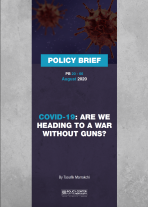Covid-19: Are we heading to a war without guns?
The crisis of the new Coronavirus is exacerbating the tensions between the United States and China, thus foreshadowing a war without guns, in which the stakes are neither territorial nor ideological, but economic. Having adopted a vehement attitude towards China, well before this crisis, the tenant of the White House has brandished the threat of economic sanctions against China and is pushing towards its isolation on the international scene in order to contain its influence. In contradiction with Deng Xiao Ping’s famous maxim “Hide your strength and bide your time”, Xi Jinping’s China claims to be a key player on the world chessboard whose quest for supremacy, with its variable geometry, is less and less camouflaged. In this war, the battlefield is likely to witness the confrontation of two antagonistic strategic alliances: on the one hand, the transatlantic alliance, led by the United States and supported by other allied countries such as Australia, New Zealand and the Gulf States and, on the other hand, a more discreet coalition, but no less present, would be composed of China, Russia, Iran, North Korea and all the states, formerly satellites of Russia, nowadays China’s affiliates, in central and south-east Asia. What are the stakes, the actors and the factors of this war? What are the objectives and strategies adopted by each coalition? What is the impact of this confrontation on the Chinese economy and on the future of its political model? This Policy Brief aims precisely to shed light on these questions. If we fly over our planet, we can see the presence of a strange thick fog, that of fear and dismay caused by a tiny living organism invisible to the naked eye: the new Coronavirus. Biologists and epidemiologists keep contradicting each other about its origin: is it the offshoot of Mother Nature or the result of laboratory manipulation? Are its mutations natural or programmed? Are its effects ephemeral or long-lasting? Does it have a cure, a vaccine, or do we have to live with it? In this climate of fear and anxiety, a total blackout has set in and human mistrust has naturally reappeared, stirred up by the most skeptical among us. The persistent conspiracy theory is slowly but surely making its way in front of the lack of transparent information about the origin of the Coronavirus.1 Even rational minds, fed by the media of all sides, have reversed their position and adhered to alarmist theories. What if it were really biological warfare waged by China against the West to bring it down to its knees? At the same time, the West is trying as best it can to torpedo the rise of the Middle Kingdom. The mess created by this devious but exterminating virus seems to be just the beginning of a long, dark tunnel. Beyond the deaths reported throughout the world, it is a political, economic, social and psychological coma, which we are witnessing and which will undoubtedly leave deep scars on populations and international relations. The situation that is about to emerge is such that it is compared by some observers to the Great Depression of 1929, or even worse. Taken by surprise, governments no longer know where they stand. Their statements are followed by counter-declarations, their decisions are questioned. Internal disputes within the body politic are back on the agenda and international cooperation has gone bankrupt. In the heat of the moment, some Western governments openly accuse China of being guilty of the global disaster and cast discredit on its ability to contain the spread of the virus on its territory. More and more voices are being raised calling for an international investigation on the Chinese soil to determine the origin of the virus. The tenant of the White House, very vocal towards Beijing long before the crisis, is threatening this country with economic sanctions and demanding heavy compensation; the most radical of its Republican supporters3 are pressing for China’s isolation on the international scene. Once the fog lifts, other countries that have paid a heavy price in this health crisis will certainly follow the lead of the United States. While it is hard to believe that China would easily bow to Western injunctions, a fierce battle is expected that would plunge the two belligerents into a war without guns. A war in which the dividing lines would not be as sharp as in the Cold War, because their converging economic systems have made them partners-opponents. A war in which alliances would be redesigned and in which mistrust, espionage and dirty tricks would be the rule. In any case, a conventional war seems far from being on the agenda, the basic issue being neither territorial nor ideological, but economic. This silent, if not invisible, war would break out in four areas: political, economic, technological and psychological. The initiative for the first attack would come from the Western camp, a camp that has become aware that its hegemony is at stake in front of the Chinese dragon that has become increasingly aggressive, forcing international recognition and whose quest for supremacy is less and less masked.










